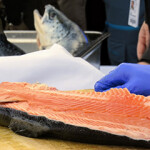MSC warns warming seas in Northeast Atlantic could harm key fish stocks

The Marine Stewardship Council is warning a record-breaking marine heat wave in the North Atlantic, on top of warming seas linked to climate change, could significantly impact pelagic fish species in the Northeast Atlantic Ocean already being overexploited.
The MSC said mackerel, Atlanto-Scandian herring, and blue whiting could all see their populations drop due to the warming waters as they rely on cooler waters to reproduce and maintain a healthy population. The warming waters could also drive the species further north – requiring governments to work together to effectively monitor and manage shared fish stocks.
“We know these pelagic fish stocks are sensitive to temperature changes. We have already seen that climate affects their distribution, their ability to spawn, and mortality rates. Rapid warming of the seas could accelerate these changes,” Norway Institute of Marine Research Principal Scientist Olav Sigurd Kjesbu said. “They could also have a significant impact on the ability of herring and blue whiting to reproduce based on recent analyses."
The warning for the status of the stocks comes after management of the Northeast Atlantic pelagic species have had a tumultuous few years. The MSC suspended its certification of Northeast Atlantic mackerel, a fishery which spans eight different countries, in 2019 after the regions’ governments failed to set quotas that fell in line with scientific advice from the International Council for the Exploration of the Sea. Then on 30 December, 2020, the MSC suspended its certifications of Atlanto-Scandian herring and blue whiting after a lack of international effort in setting the quota low enough to follow scientific advice.
The lack of adequate management pushed a number of retailers and processors to form the North Atlantic Pelagic Advocacy Group (NAPA) to attempt to drive changes in management. The group launched a “policy fishery improvement project” (FIP) for Northeast Atlantic mackerel and Atlanto-Scandian herring fisheries designed to drive political will to cooperate on decision-making and secure sustainable management of the pelagic stocks.
NAPA has also advocated for quota cuts to bring the three suspended fisheries back in line with scientific advice. If the management problems aren’t fixed, multiple aquafeed companies that are members of NAPA have vowed to stop buying the species in question.
As the key fishing nations continue to fight over quotas, MSC is warning that warming waters are creating a “perfect storm” to put the future health of the stocks at even more risk.
“As seas become warmer and marine heat waves more frequent, governments must prioritise managing these stocks sustainably to help ensure they are resilient to climate change impacts,” the MSC said. “If they cannot agree on climate-smart fishery management strategies, the consequences on fish populations will be even more severe, with research finding that warming seas, including marine heat waves, have reduced some Atlanto-Scandian herring populations by 40 percent between 2005 and 2015.”
MSC Regional Director for Europe Erin Priddle said the lack of action by governments will only increase the risk of overexploitation and potential stock collapse.
“Take the example of Atlanto-scandian herring in the 1960s, where overfishing and mismanagement of the stock led to huge economic and social consequences, with many fisheries and herring processors going bankrupt and thousands of jobs lost,” Priddle said. “With even greater political and environmental change ahead, we must learn from the past and ensure that fisheries management is climate-ready, resilient, and adaptive to change.”
Photo courtesy of Alessandro De Maddalena/Shutterstock






Share